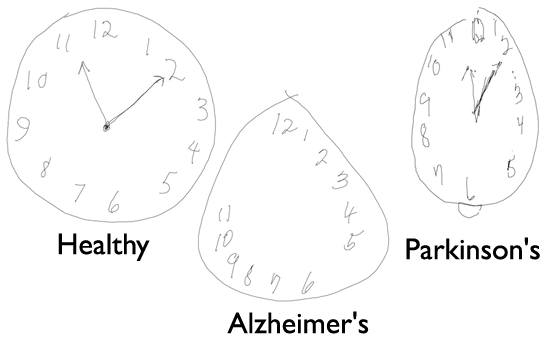A team from CSAIL has won a prestigious analytics award based on their research about how digitally-connected tools could be used to help diagnose brain disorders.
A decade-long partnership between MIT professor Randall Davis and Dr. Dana Penney of the Lahey Hospital and Medical Center in Burlington produced work that has been selected as the winner of the 2016 Innovative Applications in Analytics Award, presented by the Institute for Operations Research and the Management Sciences (INFORMS) Analytics Section.
Last year, Davis, Penney, and their collaborators William Souillard-Mandar and Cynthia Rudin published a paper demonstrating a set of analytical and machine learning techniques that, when coupled with existing hardware, opens up the possibility of detecting disorders such as dementia earlier than ever before.
For several decades, doctors have screened for conditions including Parkinson’s and Alzheimer’s with the clock drawing test, which asks subjects to draw an analog clock-face showing a specified time, and to copy a pre-drawn clock. Dr. Penney has been the clinical lead on the project, with test collection going on at Lahey and partnering medical institutions.
The project uses a commercially available digitizing ballpoint pen that measures its position on the paper 75 times a second via a camera built into the pen. This provides data that are far more precise than can be measured on an ordinary drawing, and captures timing information. Davis and Penney created software that computes a large number of novel measurements on this data, enabling the analysis of both the end product -- the drawing -- and the process that produced it, i.e., all of the subject’s movements and hesitations .
Souillard-Mandar, then a graduate student at CSAIL in Davis’ group, worked with Davis to use these measurements together with a variety of machine learning techniques to create models that could be used for the screening and diagnosis of a variety of cognitive conditions, including memory impairments, Parkinson’s Disease, and others. The research produced both models with high accuracy – significantly outperforming existing clock scoring systems – and models (developed in partnership with MIT Professor Cynthia Rudin and her graduate student Berk Ustun) designed to be understandable by clinicians.
Souillard-Mandar is now Director of Analytics and Machine Learning at Digital Cognition Technologies, a start-up that is commercializing the research.
Davis is a principal investigator at CSAIL and professor in the department of Electrical Engineering and Computer Science. He serves on several editorial boards in the artificial intelligence field, was a Founding Fellow of the Association for the Advancement of AI, served as president of the organization, and has won numerous awards for his contributions.
Rudin is an associate professor of statistics at the Sloan School of Management, and directs the Prediction Analysis Lab. She is the recipient of the 2013 INFORMS Innovative Applications in Analytics Award, an NSF CAREER award, and was named by Businessinsider.com as one of the 12 most impressive professors at MIT in 2015.
Penney is principal investigator for the Lahey-sponsored ClockSketch Consortium, leading a multicenter investigation of novel diagnostic cognitive markers. She is director of neuropsychology in neurology and assistant clinical professor of neurology at Tufts University School of Medicine, and a Fellow of the National Academy of Neuropsychology.
In addition to a cash award of $2000, the team will be recognized at INFORMS’ fall meeting in Nashville in November.
